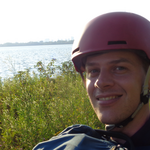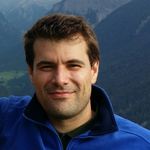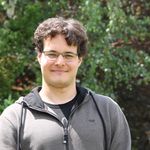This project consists of three subprojects based in Augsburg, Karlsruhe, and Fribourg (Switzerland), respectively.
- New directions in positive scalar curvature geometry. We will study obstructions to and constructions of positive scalar curvature metrics on manifolds of low dimensions, manifolds with finite fundamental groups, manifolds with Baas-Sullivan singularities and non-compact manifolds. We will work on several versions of index theoretic obstructions on non-compact manifolds, relying on the coarse geometry approach of Roe and on the index theory of Dirac operators of Callias type. We will continue our research aiming at the construction of non-zero classes in higher homotopy groups of spaces and moduli spaces of positive scalar curvature metrics on non-compact manifolds.
- Moduli spaces of Riemannian metrics: topology, topologies, and compactifications. We will investigate moduli spaces of Riemannian metrics of non-negative Ricci curvature on closed and open manifolds, aiming in particular at constructing first examples of simply connected manifolds for which these spaces have higher non-trivial rational cohomology and homotopy groups. Given both a manifold \(M\), or a certain class of such \(M\), and a suitable set of curvature conditions \(\mathcal C\), we will study the set of all isometry classes of such metrics satisfying \(\mathcal C\), equipped with the (pointed) Gromov-Hausdorff or \(C^{k,\alpha}\)-topologies, and its closures and compactifications.
- Moduli spaces of metrics with lower curvature bounds. We will continue our study of moduli spaces via \(\eta\)-invariants, with focus on metrics of nonnegative sectional or positive Ricci curvature and on dimensions not covered by previous results. We will try to define Kreck-Stolz-type invariants for new classes of closed manifolds including simply connected manifolds of dimension \(\neq 4k-1\). We also want to look at equivariant refinements of these invariants and investigate how these can be used to analyze the moduli space of invariant metrics with lower curvature bounds using techniques such as fixed point formulas in index theory, rigidity and equivariant bordism theory.
Publications
We show scalar-mean curvature rigidity of warped products of round spheres of dimension at least 2 over compact intervals equipped with strictly log-concave warping functions. This generalizes earlier results of Cecchini-Zeidler to all dimensions. Moreover, we show scalar curvature rigidity of round spheres of dimension at least $3$ minus two antipodal points, thus resolving a problem in Gromov's ``Four Lectures'' in all dimensions. Our arguments are based on spin geometry.
| Journal | Symmetry, Integrability and Geometry: Methods and Applications (SIGMA) |
| Volume | 20 |
| Pages | article 035, 26 pages |
| Link to preprint version | |
| Link to published version |
Related project(s):
37Boundary value problems and index theory on Riemannian and Lorentzian manifolds52Spaces and Moduli Spaces of Riemannian Metrics with Curvature Bounds on compact and non-compact Manifolds II
We study obstructions to the existence of Riemannian metrics of positive scalar curvature on closed smooth manifolds arising from torsion classes in the integral homology of their fundamental groups. As an application, we construct new examples of manifolds which do not admit positive scalar curvature metrics, but whose Cartesian products admit such metrics.
Related project(s):
52Spaces and Moduli Spaces of Riemannian Metrics with Curvature Bounds on compact and non-compact Manifolds II
We extend the K-cowaist inequality to generalized Dirac operators in the sense of Gromov and Lawson and study applications to manifolds with boundary.
Related project(s):
37Boundary value problems and index theory on Riemannian and Lorentzian manifolds52Spaces and Moduli Spaces of Riemannian Metrics with Curvature Bounds on compact and non-compact Manifolds II
Based on the Atiyah-Patodi-Singer index formula, we construct an obstruction to positive scalar curvature metrics with mean convex boundaries on spin manifolds of infinite K-area. We also characterize the extremal case. Next we show a general deformation principle for boundary conditions of metrics with lower scalar curvature bounds. This implies that the relaxation of boundary conditions often induces weak homotopy equivalences of spaces of such metrics. This can be used to refine the smoothing of codimension-one singularites a la Miao and the deformation of boundary conditions a la Brendle-Marques-Neves, among others. Finally, we construct compact manifolds for which the spaces of positive scalar curvature metrics with mean convex boundaries have nontrivial higher homotopy groups.
| Publisher | World Scientific |
| Book | M Gromov, B. Lawson (eds): Perspectives in Scalar Curvature |
| Volume | 2 |
| Pages | 325-377 |
| Link to preprint version | |
| Link to published version |
Related project(s):
37Boundary value problems and index theory on Riemannian and Lorentzian manifolds52Spaces and Moduli Spaces of Riemannian Metrics with Curvature Bounds on compact and non-compact Manifolds II
We prove the following Lipschitz rigidity result in scalar curvature geometry. Let $M$ be a closed smooth connected spin manifold of even dimension $n$, let $g$ be a Riemannian metric of regularity $W^{1,p}$, $p > n$, on $M$ whose distributional scalar curvature in the sense of Lee-LeFloch is bounded below by $n(n-1)$, and let $f \colon (M,g) \to \mathbb{S}^n$ be a $1$-Lipschitz continuous (not necessarily smooth) map of non-zero degree to the unit $n$-sphere. Then $f$ is a metric isometry. This generalizes a result of Llarull (1998) and answers in the affirmative a question of Gromov (2019) in his "four lectures". Our proof is based on spectral properties of Dirac operators for low regularity Riemannian metrics and twisted with Lipschitz bundles, and on the theory of quasiregular maps due to Reshetnyak.
Related project(s):
42Spin obstructions to metrics of positive scalar curvature on nonspin manifolds52Spaces and Moduli Spaces of Riemannian Metrics with Curvature Bounds on compact and non-compact Manifolds II58Profinite perspectives on l2-cohomology73Geometric Chern characters in p-adic equivariant K-theory
Given a manifold $M$, we completely determine which rational $\kappa$-classes are non-trivial for (fiber homotopy trivial) $M$-bundles over the $k$-sphere, provided that the dimension of $M$ is large compared to $k$. We furthermore study the vector space of these spherical $\kappa$-classes and give an upper and a lower bound on its dimension. The proof is based on the classical approach to studying diffeomorphism groups via block bundles and surgery theory and we make use of ideas developed by Krannich--Kupers--Randal-Williams.
As an application, we show the existence of elements of infinite order in the homotopy groups of the spaces $\mathcal R_{\mathrm{Ric}>0}(M)$ and $\mathcal R_{\mathrm{sec}>0}(M)$ of positive Ricci and positive sectional curvature, provided that $M$ is $\mathrm{Spin}$, has a non-trivial rational Pontryagin class and admits such a metric. This is done by showing that the $\kappa$-class associated to the $\hat{\mathcal A}$-class is spherical for such a manifold.
In the appendix co-authored by Jens Reinhold it is (partially) determined which classes of the rational oriented cobordism ring contain an element that fibers over a sphere of a given dimension.
Related project(s):
9Diffeomorphisms and the topology of positive scalar curvature15Spaces and Moduli Spaces of Riemannian Metrics with Curvature Bounds on compact and non-compact Manifolds52Spaces and Moduli Spaces of Riemannian Metrics with Curvature Bounds on compact and non-compact Manifolds II
In this paper we study spaces of Riemannian metrics with lower bounds on intermedi- ate curvatures. We show that the spaces of metrics of positive p-curvature and k-positive Ricci curvature on a given high-dimensional Spin-manifold have many non-trivial homotopy groups provided that the manifold admits such a metric.
| Journal | Geometriae Dedicata |
| Link to preprint version | |
| Link to published version |
Related project(s):
15Spaces and Moduli Spaces of Riemannian Metrics with Curvature Bounds on compact and non-compact Manifolds52Spaces and Moduli Spaces of Riemannian Metrics with Curvature Bounds on compact and non-compact Manifolds II
We construct and study an H-space multiplication on \(\mathcal{R}^+(M)\) for manifolds M which are nullcobordant in their own tangential 2-type. This is applied to give a rigidity criterion for the action of the diffeomorphism group on \(\mathcal{R}^+(M)\) via pullback. We also compare this to other known multiplicative structures on \(\mathcal{R}^+(M)\).
| Journal | Transactions of the AMS |
| Link to preprint version | |
| Link to published version |
Related project(s):
9Diffeomorphisms and the topology of positive scalar curvature15Spaces and Moduli Spaces of Riemannian Metrics with Curvature Bounds on compact and non-compact Manifolds52Spaces and Moduli Spaces of Riemannian Metrics with Curvature Bounds on compact and non-compact Manifolds II
We present a rigidity theorem for the action of the mapping class group \(\pi_0(\mathrm{Diff}(M))\)on the space \(\mathcal{R}^+(M)\) of metrics of positive scalar curvature for high dimensional manifolds M. This result is applicable to a great number of cases, for example to simply connected 6-manifolds and high dimensional spheres. Our proof is fairly direct, using results from parametrised Morse theory, the 2-index theorem and computations on certain metrics on the sphere. We also give a non-triviality criterion and a classification of the action for simply connected 7-dimensional Spin-manifolds.
| Journal | Mathematische Annalen |
| Link to preprint version | |
| Link to published version |
Related project(s):
9Diffeomorphisms and the topology of positive scalar curvature15Spaces and Moduli Spaces of Riemannian Metrics with Curvature Bounds on compact and non-compact Manifolds52Spaces and Moduli Spaces of Riemannian Metrics with Curvature Bounds on compact and non-compact Manifolds II
After R. Schoen completed the solution of the Yamabe problem, compact manifolds could be allocated in three classes depending on whether they admit a metric with positive, non-negative or only negative scalar curvature. Here we follow Yamabe's first attempt to solve his problem through variational methods and provide an analogous equivalent classification for manifolds equipped with actions by non-discrete compact Lie groups. Moreover, we apply the method, and the results to classify total spaces of fibre bundles with compact structure groups (concerning scalar curvature), to conclude density results, and compare realizable scalar curvature functions between some exotic manifolds their standard counterpart. We also provide an extended range of prescribed scalar curvature functions of warped products, especially with Calabi--Yau manifolds, providing an upper bound for the first positive eigenvalue of the Laplacian under relatively mild conditions.
Related project(s):
52Spaces and Moduli Spaces of Riemannian Metrics with Curvature Bounds on compact and non-compact Manifolds II
Based on Morse theory for the energy functional on path spaces we develop a deformation theory for mapping spaces of spheres into orthogonal groups. This is used to show that these mapping spaces are weakly homotopy equivalent, in a stable range, to mapping spaces associated to orthogonal Clifford representations. Given an oriented Euclidean bundle $V \to X$ of rank divisible by four over a finite complex $X$ we derive a stable decomposition result for vector bundles over the sphere bundle $\mathbb{S}( \mathbb{R} \oplus V)$ in terms of vector bundles and Clifford module bundles over $X$. After passing to topological K-theory these results imply classical Bott-Thom isomorphism theorems.
| Journal | São Paulo Journal of Mathematical Sciences (to appear) |
| Link to preprint version |
Related project(s):
15Spaces and Moduli Spaces of Riemannian Metrics with Curvature Bounds on compact and non-compact Manifolds52Spaces and Moduli Spaces of Riemannian Metrics with Curvature Bounds on compact and non-compact Manifolds II
In each dimension $4k+1\geq 9$, we exhibit infinite families of closed manifolds with fundamental group $\mathbb Z_2$ for which the moduli space of metrics of nonnegative sectional curvature has infinitely many path components. Examples of closed manifolds with finite fundamental group with this property were known before only in dimension $5$ and dimensions $4k+3\geq 7$.
Related project(s):
15Spaces and Moduli Spaces of Riemannian Metrics with Curvature Bounds on compact and non-compact Manifolds52Spaces and Moduli Spaces of Riemannian Metrics with Curvature Bounds on compact and non-compact Manifolds II
These are the refereed proceedings of the 2019 'Australian-German Workshop on Differential Geometry in the Large' which represented a cross section of topics across differential geometry, geometric analysis and differential topology. The two-week programme featured talks treating geometric evolution equations, structures on manifolds, non-negative curvature and topics in Kähler, Alexandrov and Sasaki geometry as well as differential topology.
| Journal | London Mathematical Society Lecture Notes Series |
| Publisher | Cambridge University Press |
| Book | Differential Geometry in the Large |
| Volume | 463 |
| Pages | 398 |
| Link to preprint version | |
| Link to published version |
Related project(s):
52Spaces and Moduli Spaces of Riemannian Metrics with Curvature Bounds on compact and non-compact Manifolds II
Team Members
Prof. Dr. Anand Dessai
Project leader
Université de Fribourg
anand.dessai(at)unifr.ch
Sam Hagh Shenas Noshari
Researcher
Université de Fribourg
sam.haghshenasnoshari(at)unifr.ch
Prof. Dr. Bernhard Hanke
Project leader
Universität Augsburg
hanke(at)math.uni-augsburg.de
Dr. Christian Ketterer
Researcher
Albert-Ludwigs-Universität Freiburg
christian.ketterer(at)math.uni-freiburg.de
Dr. Philippe Kupper
Researcher
Karlsruher Institut für Technologie
philippe.kupper(at)kit.edu
Dr. Artem Nepechiy
Researcher
Karlsruher Institut für Technologie
artem.nepechiy(at)kit.edu
Ph.D. Philipp Reiser
Researcher
Université de Fribourg
philipp.reiser(at)unifr.ch
Prof. Dr. Wilderich Tuschmann
Project leader
Karlsruher Institut für Technologie
wilderich.tuschmann(at)kit.edu
Former Members
Dr. Leonardo Francisco Cavenaghi
Researcher
IMECC/UNICAMP Campinas
kvenaghi(at)unicamp.br








